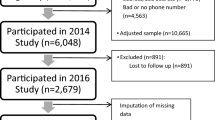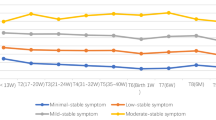Abstract
Many young children with developmental delay who are eligible for early intervention (EI) services fail to receive them. We assessed the relationship between depressive symptoms in mothers, a potentially modifiable risk, and receipt of EI services by their eligible children. We conducted multivariable analyses of a nationally representative sample of children eligible for EI services at 24 months using data from the Early Childhood Longitudinal Study-Birth Cohort. Maternal depressive symptoms were assessed at 9 and 24 months. Birthweight <1,000 g, genetic and medical conditions associated with developmental delay, or low scores on measures of developmental performance defined EI eligibility. Service receipt was ascertained from parental self-report. Models were adjusted for sociodemographic and child risk. Among the 650 children who were eligible to receive EI services as infants, 33.2% of children whose mothers were depressed received services compared to 27.0% whose mothers were not depressed (aOR 1.8; 95% CI 0.8, 4.0). Among the 650 children who became eligible to receive services as toddlers, 13.0% of children whose mothers were depressed received services compared to 2.6% whose mothers were not depressed (aOR 4.6, 95% CI 1.5, 14.6). Among children receiving EI services, prevalence of depressive symptoms was 23.0% for mothers whose children became eligible as infants and 57.5% for mothers whose children became eligible as toddlers. Depressive symptoms in mothers of children eligible to receive EI services did not appear to limit participation. EI programs may be an appropriate setting in which to address maternal depressive symptoms.
Similar content being viewed by others
Notes
All unweighted N’s are rounded to the nearest 50 subjects in accordance with the ECLS-B restricted data use license.
Complete data available from authors on request.
References
Data Accountability Center. (2009). Individuals with disabilities education act data: Part C trend data. Available from: http://www.ideadata.org/PartCTrendDataFiles.asp. Cited 6 Jan 2010.
Riley, A. W., et al. (2008). Development of a family-based program to reduce risk and promote resilience among families affected by maternal depression: Theoretical basis and program description. Clinical Child and Family Psychology Review, 11(1–2), 12–29.
Bailey, D. B., Jr, et al. (2005). Thirty-six-month outcomes for families of children who have disabilities and participated in early intervention. Pediatrics, 116(6), 1346–1352.
Rosenberg, S. A., Zhang, D., & Robinson, C. C. (2008). Prevalence of developmental delays and participation in early intervention services for young children. Pediatrics, 121(6), e1503–e1509.
Wang, C. J., et al. (2009). Factors influencing the enrollment of eligible extremely-low-birth-weight children in the part C early intervention program. Academic Pediatrics, 9(4), 283–287. %U http://www.ncbi.nlm.nih.gov.ezproxy.bu.edu/pubmed/19482532.
Grace, S. L., Evindar, A., & Stewart, D. E. (2003). The effect of postpartum depression on child cognitive development and behavior: A review and critical analysis of the literature. Archives of Women’s Mental Health, 6, 263–274.
Cox, J., et al. (1996). Validation of the Edinburgh Postnatal Depression Scale (EPDS) in non-postnatal women. Journal of Affective Disorders, 39(3), 185–189.
Murray, L., & Cooper, P. (1997). Postpartum depression and child development. Psychological Medicine, 27, 253–260.
Murray, L., et al. (1996). The impact of postnatal depression and associated adversity on early mother-infant interactions and later infant outcome. Child Development, 67, 2512–2526.
Minkovitz, C. S., et al. (2005). Maternal depressive symptoms and children’s receipt of health care in the first 3 years of life. Pediatrics, 115, 306–314.
Murray, L. (1992). The impact of postnatal depression on infant development. Journal of Child Psychology and Psychiatry, 33, 543–561.
Zuckerman, B., et al. (1990). Maternal depressive symptoms during pregnancy, and newborn irritability. Journal of Developmental and Behavioral Pediatrics, 11, 190–194.
Righetti-Veltema, M., et al. (2002). Postpartum depression and mother-infant relationship at 3 months old. Journal of Affective Disorders, 70, 291–306.
Hay, D. F., & Pawlby, S. (2003). Prosocial development in relation to children’s and mothers’ psychological problems. Child Development, 74(5), 1314–1327.
Weissman, M. M., et al. (1987). Children of depressed parents. Increased psychopathology and early onset of major depression. Archives of General Psychiatry, 44, 847–853.
O’Brien, L. M., et al. (2004). Postnatal depression and faltering growth: A community study. Pediatrics, 113, 1242–1247.
Lesesne, C. A., Visser, S. N., & White, C. P. (2003). Attention-deficit/hyperactivity disorder in school-aged children: Association with maternal mental health and use of health care resources. Pediatrics, 111(5 Part 2), 1232–1237. %U http://www.ncbi.nlm.nih.gov.ezproxy.bu.edu/pubmed/12728144.
Sharp, D., et al. (1995). The impact of postnatal depression on boys’ intellectual development. Journal of Child Psychology and Psychiatry, 36, 1315–1336.
Hammen, C., et al. (1987). Maternal affective disorders, illness, and stress: Risk for children’s psychopathology. American Journal of Psychiatry, 144, 736–741.
Orr, S. T., & James, S. (1984). Maternal depression in an urban pediatric practice: Implications for health care delivery. American Journal of Public Health, 74, 363–365.
Davis, L., et al. (2003). The impact of very premature birth on the psychological health of mothers. Early Human Development, 73(1–2), 61–70.
Drewett, R., et al. (2004). Failure to thrive in the term and preterm infants of mothers depressed in the postnatal period: A population-based birth cohort study. Journal of Child Psychology and Psychiatry, and Allied Disciplines, 45(2), 359–366. %U http://www.ncbi.nlm.nih.gov.ezproxy.bu.edu/pubmed/14982248.
Singer, L., et al. (1999). Maternal psychological distress and parenting stress after the birth of a very low-birth-weight infant. JAMA, 281(9), 799–805.
Manuel, J., et al. (2003). Stress and adaptation in mothers of children with cerebral palsy. Journal of Pediatric Psychology, 28(3), 197–201.
Montes, G., & Halterman, J. S. (2007). Psychological functioning and coping among mothers of children with autism: A population-based study. Pediatrics, 119(5), e1040–e1046.
Singer, G. (2006). Meta-analysis of comparative studies of depression in mothers of children with and without developmental disabilities. American Journal of Mental Retardation, 111(3), 155–169.
Dietz, P. M., et al. (2007). Clinically identified maternal depression before, during, and after pregnancies ending in live births. American Journal of Psychiatry, 164(10), 1515–1520.
Hebbeler, K., Spiker, D., & Mallik, S. (2003) National early intervention longitudinal study: Demographic characteristics of children and families entering early intervention. In NEILS data report no. 3. SRI International.
Churchill, S. S., et al. (2010). Parents of children with special health care needs who have better coping skills have fewer depressive symptoms. Maternal and Child Health Journal, 14(1), 47–57.
Shackelford, J. (2006). State and Jurisdictional Eligibility Definitions for Infants and Toddlers with Disabilities under IDEA. NECTAC Notes. Issue No. 20. National Early Childhood Technical Assistance Center (NECTAC).
Bayley, N. (1993). Bayley scales of infant development (2nd ed.). San Antonio, TX: Psychological Corporation.
Andreassen, C., & Fletcher, P. (2005). Early Childhood Longitudinal Study, Birth Cohort (ECLS-B) methodology report for the nine-month data collection (2001?02). Vol. 1: Psychometric characteristics. NCES 2005-100. US Department of Education.
Andreassen, C. & Fletcher, P. (2007). Early Childhood Longitudinal Study, Birth Cohort (ECLS-B): Psychometric report for the 2-year data collection. Methodology report. NCES 2007-084. National Center for Education Statistics.
Radloff, L. (1977). The CES-D Scale: A self-report depression scale for research in the general population. Applied Psychological Measurement, 1, 385–401.
Civic, D., & Holt, V. L. (2000). Maternal depressive symptoms and child behavior problems in a nationally representative normal birthweight sample. Maternal and Child Health Journal, 4, 215–221.
Chung, E. K., et al. (2004). Maternal depressive symptoms and infant health practices among low-income women. Pediatrics, 113(6), e523–e529.
Webb, D. A., et al. (2008). Postpartum physical symptoms in new mothers: Their relationship to functional limitations and emotional well-being. Birth, 35(3), 179–187.
Nord, C., et al. (2005). Early Childhood Longitudinal Study, Birth Cohort (ECLS-B) user’s manual for the ECLS-B nine-month public-use data file and electronic code book. NCES 2005-013. Jessup, MD: ED Pubs.
Zich, J. M., Attkisson, C. C., & Greenfield, T. K. (1990). Screening for depression in primary care clinics: The CES-D and the BDI. International Journal of Psychiatry in Medicine, 20, 259–277.
Kessler, R. C., et al. (1998). The World Health Organization Composite International Diagnostic Interview short-form (CIDI-SF). International Journal of Methods in Psychiatric Research, 7(4), 171–185.
Kroenke, K., Spitzer, R. L., & Williams, J. B. (2003). The patient health questionnaire-2: Validity of a two-item depression screener. Medical Care, 41, 1284–1292.
SAS Institute Inc. (2002–2003). SAS for windows version 9.1. Cary, NC.
Wells, K. B., et al. (1989). The functioning and well-being of depressed patients. Results from the Medical Outcomes Study. JAMA, 262, 914–919.
Pirraglia, P. A., et al. (2004). Depressive symptom burden as a barrier to screening for breast and cervical cancers. Journal of Womens Health (Larchmt), 13(6), 731–738.
Rimington, L. D., et al. (2001). Relationship between anxiety, depression, and morbidity in adult asthma patients. Thorax, 56(4), 266–271.
Goldney, R. D., et al. (2003). Asthma symptoms associated with depression and lower quality of life: A population survey. Medical Journal of Australia, 178(9), 437–441.
Gonzalez, J. S., et al. (2007). Depression, self-care, and medication adherence in type 2 diabetes: Relationships across the full range of symptom severity. Diabetes Care, 30(9), 2222–2227.
Ciechanowski, P. S., Katon, W. J., & Russo, J. E. (2000). Depression and diabetes: Impact of depressive symptoms on adherence, function, and costs. Archives of Internal Medicine, 160(21), 3278–3285.
Zajicek-Farber, M. (2008). Postnatal depression and infant health practices. Journal of Child and Family Studies, (18), 236–245.
Janicke, D. M., Finney, J. W., & Riley, A. W. (2001). Children’s health care use: A prospective investigation of factors related to care-seeking. Medical Care, 39(9), 990–1001.
Mandl, K. D., et al. (1999). Infant health care use and maternal depression. Archives of Pediatrics and Adolescent Medicine, 153, 808–813.
Bartlett, S. J., et al. (2001). Maternal depressive symptoms and emergency department use among inner-city children with asthma. Archives of Pediatrics and Adolescent Medicine, 155, 347–353.
Weinreb, L., et al. (1998). Determinants of health and service use patterns in homeless and low-income housed children. Pediatrics, 102(3 Pt 1), 554–562.
Green, M., & Solnit, A. J. (1964). Reactions to the threatened loss of a child: A vulnerable child syndrome. Pediatric management of the dying child, part III. Pediatrics, 34, 58–66.
Levy, J. C. (1980). Vulnerable children: Parents’ perspectives and the use of medical care. Pediatrics, 65(5), 956–963.
Allen, E. C., et al. (2004). Perception of child vulnerability among mothers of former premature infants. Pediatrics, 113(2), 267–273.
Benson, P. R. (2006). The impact of child symptom severity on depressed mood among parents of children with ASD: The mediating role of stress proliferation. Journal of Autism and Developmental Disorders, 36(5), 685–695.
Bromley, J., et al. (2004). Mothers supporting children with autistic spectrum disorders: Social support, mental health status and satisfaction with services. Autism, 8(4), 409–423.
Interactive Autism Network Community. (2008). Parental depression history: IAN Research Report #7—October 2008.
Olsson, M. B., & Hwang, C. P. (2001). Depression in mothers and fathers of children with intellectual disability. Journal of Intellectual Disability Research, 45(Pt 6), 535–543.
Bailey, D., et al. (2004). National early intervention longitudinal study: Family outcomes at the end of early intervention.
National Research Council and Institute of Medicine. (2009). Depression in parents, parenting, and children: Opportunities for to improve identification, treatment, and prevention. In P.P. Committee on Depression, and Healthy Development of Children. Board on Children, Youth, and Families. Division of Behavioral and Social Sciences and Education (Eds.). Washington, DC: National Academies Press.
Council on Children with Disabilities, et al. (2006). Identifying infants and young children with developmental disorders in the medical home: An algorithm for developmental surveillance and screening. Pediatrics, 118(1), 405–420.
Acknowledgments
This project was supported by a grant from the Maternal and Child Health Bureau R40 MC08593. Additional support was provided by K23 career development awards (Feinberg K23NR010588; Silverstein K23MH074079). We thank Howard Bauchner, MD, Howard Cabral, PhD, Eugene Declercq, PhD, and Milton Kotelchuck, PhD, MPH, for their thoughtful review of the manuscript.
Author information
Authors and Affiliations
Corresponding author
Electronic supplementary material
Below is the link to the electronic supplementary material.
Rights and permissions
About this article
Cite this article
Feinberg, E., Donahue, S., Bliss, R. et al. Maternal Depressive Symptoms and Participation in Early Intervention Services for Young Children. Matern Child Health J 16, 336–345 (2012). https://doi.org/10.1007/s10995-010-0715-3
Published:
Issue Date:
DOI: https://doi.org/10.1007/s10995-010-0715-3




